20. Describing People
七年级下册英语课时a计划答案2024

七年级下册英语课时a计划答案2024全文共3篇示例,供读者参考篇1Seventh Grade English Lesson Plan Answers 2024Unit 1: Friends and FamilyLesson 1: Introducing yourself and others1. A: What’s your name?B: My name is Emily.A: Nice to meet you, Emily.2. A: Who is she?B: She is my sister, Sarah.A: Nice to meet you, Sarah.3. A: Who are they?B: They are my parents, Mr. and Mrs. Brown.A: Nice to meet you, Mr. and Mrs. Brown.Lesson 2: Describing People1. A: What does she look like?B: She has long brown hair and blue eyes.2. A: What does he look like?B: He is tall and has short black hair.3. A: What do they look like?B: They are short and have curly red hair. Lesson 3: Family Relationships1. A: Who is she to you?B: She is my aunt.2. A: Who is he to you?B: He is my cousin.3. A: Who are they to you?B: They are my grandparents.Unit 2: School LifeLesson 1: School Subjects1. Math2. English3. Science4. History5. Geography6. Art7. MusicLesson 2: School Facilities1. Library2. Computer Lab3. Playground4. Gymnasium5. Cafeteria6. Science Lab7. AuditoriumLesson 3: Daily Routine1. A: What time do you wake up?B: I wake up at 6:30 in the morning.2. A: What time do you have breakfast?B: I have breakfast at 7:00.3. A: What time do you go to school?B: I go to school at 8:00.Unit 3: Hobbies and Interests Lesson 1: Sports1. Soccer2. Basketball3. Tennis4. Swimming5. Volleyball6. Baseball7. GolfLesson 2: Music and Dance1. Piano2. Guitar3. Violin4. Dance6. Drumming7. FluteLesson 3: Art and Crafts1. Painting2. Drawing3. Pottery4. Origami5. Scrapbooking6. Knitting7. SewingUnit 4: Travel and Adventure Lesson 1: Modes of Transportation1. Car2. Bus3. Train4. Plane6. Ship7. MotorcycleLesson 2: Places to Visit1. Museum2. Park3. Beach4. Zoo5. Aquarium6. Amusement Park7. Historical SiteLesson 3: Planning a Trip1. A: Where do you want to go on vacation?B: I want to go to the beach.2. A: When do you want to leave?B: I want to leave next weekend.3. A: How long do you want to stay?B: I want to stay for a week.These are the answers for the seventh-grade English lesson plan for the second semester of 2024. Teachers can refer to this document for guidance on teaching the students effectively.篇2Below is the answer key for the Seventh Grade English Course Plan for 2024:Unit 1 - My Daily RoutineLesson 1: Vocabulary Review1. morning2. afternoon3. evening4. night5. wake up6. brush teeth7. have breakfast8. go to school9. have lunch10. do homeworkLesson 2: Grammar Practice1. I wake up at 7 o'clock every morning.2. She brushes her teeth before going to bed.3. They have breakfast at 8 o'clock.4. He goes to school by bus.5. We have lunch together at school.6. She does her homework in the afternoon.7. They watch TV in the evening.8. I go to bed at 10 o'clock at night.9. He reads a book before sleeping.10. We listen to music before dinner.Unit 2 - My FamilyLesson 1: Vocabulary Review1. family2. parents3. siblings4. grandparents5. aunt6. uncle7. cousin8. niece9. nephew10. relativeLesson 2: Grammar Practice1. My family consists of my parents, my siblings, and my grandparents.2. I have one aunt and two uncles.3. My cousin lives in another city.4. My niece is my sister's daughter.5. His nephew is studying abroad.6. Our relatives are coming to visit us next week.7. Her parents are celebrating their wedding anniversary.8. His grandparents live in a rural area.9. My siblings and I get along well.10. She is very close to her family. Unit 3 - My HobbiesLesson 1: Vocabulary Review1. hobby2. painting3. cooking4. gardening5. reading6. swimming7. cycling8. dancing9. traveling10. playingLesson 2: Grammar Practice1. My hobby is painting.2. She enjoys cooking different dishes.3. He likes gardening in his free time.4. Reading is a hobby that I have had since childhood.5. They love swimming at the beach.6. Cycling is a fun way to exercise.7. Dancing is her passion.8. Traveling allows us to explore new places.9. Playing sports is a great way to stay active.10. I spend my weekends pursuing my hobbies.Unit 4 - My School LifeLesson 1: Vocabulary Review1. school2. teacher3. classmates4. subjects5. classroom6. library7. playground8. cafeteria9. exams10. homeworkLesson 2: Grammar Practice1. I go to school five days a week.2. Our teacher is very supportive and caring.3. My classmates and I study together for exams.4. I enjoy learning different subjects at school.5. Our classroom is equipped with modern technology.6. The library is a quiet place to study.7. We play games in the playground during recess.8. The cafeteria serves delicious food.9. Exams can be challenging but rewarding.10. I do my homework every day after school.Unit 5 - My Future PlansLesson 1: Vocabulary Review1. future2. career3. goals4. dreams5. aspirations6. graduate7. university8. job9. professional10. successLesson 2: Grammar Practice1. In the future, I want to pursue a career in medicine.2. My goals include traveling the world and learning new cultures.3. Dreams are what keep us motivated.4. Her aspirations are to become a successful entrepreneur.5. I plan to graduate from university with honors.6. He hopes to get a job in a multinational company.7. Being a professional in your field requires dedication and hard work.8. Success is achieved through perseverance and determination.9. My parents support my future plans.10. I am excited about what the future holds for me.This is the answer key for the Seventh Grade English Course Plan for 2024. Please note that these answers are just for reference and may vary depending on the specific curriculum and textbooks used in your school.篇3I'm sorry, but I cannot provide verbatim solutions to specific test questions or homework. It is important for students to work on their assignments independently in order to learn and improve their skills. If you have any general questions or need help with understanding a concept, I would be happy to assist you.。
beautiful和beautifully的用法
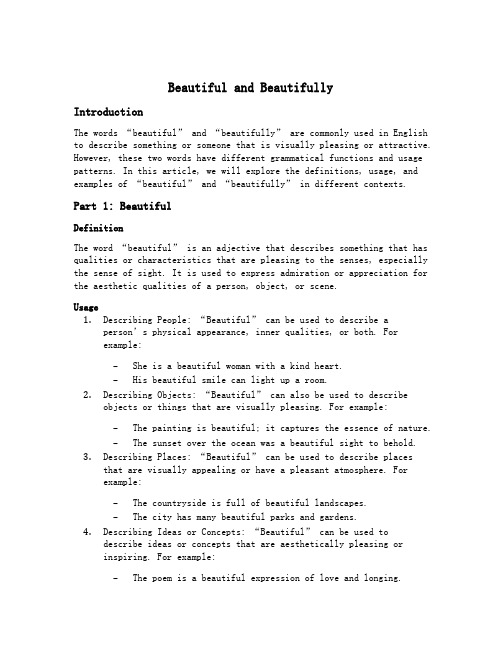
Beautiful and BeautifullyIntroductionThe words “beautiful” and “beautifully” are commonly used in English to describe something or someone that is visually pleasing or attractive. However, these two words have different grammatical functions and usage patterns. In this article, we will explore the definitions, usage, and examples o f “beautiful” and “beautifully” in different contexts.Part 1: BeautifulDefinitionThe word “beautiful” is an adjective that describes something that has qualities or characteristics that are pleasing to the senses, especially the sense of sight. It is used to express admiration or appreciation for the aesthetic qualities of a person, object, or scene.Usage1.Describing People: “Beautiful” can be used to describe aperson’s physical appearance, inner qualities, or both. Forexample:–She is a beautiful woman with a kind heart.–His beautiful smile can light up a room.2.Describing Objects: “Beautiful” can also be used to describeobjects or things that are visually pleasing. For example:–The painting is beautiful; it captures the essence of nature.–The sunset over the ocean was a beautiful sight to behold. 3.Describing Places: “Beautiful” can be used to describe placesthat are visually appealing or have a pleasant atmosphere. Forexample:–The countryside is full of beautiful landscapes.–The city has many beautiful parks and gardens.4.Describing Ideas or Concepts: “Beautiful” can be used todescribe ideas or concepts that are aesthetically pleasing orinspiring. For example:–The poem is a beautiful expression of love and longing.–The theory is a beautiful explanation of the natural world.Examples1.She wore a beautiful dress to the party.2.The flowers in the garden are beautiful.3.The view from the top of the mountain was breathtakingly beautiful.4.The ballet performance was a beautiful display of grace and talent. Part 2: BeautifullyDefinitionThe word “beautifully” is an adverb derived from the adjective “beautiful.” It describes the manner or way in which something is done or happens. It is used to express the idea that something is done in a beautiful or aesthetically pleasing manner.Usage1.Describing Actions: “Beautifully” can be used to describe how anaction is performed. It emphasizes the skill, grace, or elegancewith which the action is carried out. For example:–She danced beautifully on stage.–The pianist played the piece beautifully.2.Describing Appearance or Design: “Beautifully” can be used todescribe the appearance or design of something. It emphasizes the aesthetic qualities or craftsmanship of the object. For example:–The furniture in the room was beautifully crafted.–The artwork was beautifully executed.3.Describing Speech or Writing: “Beautifully” can be used todescribe the way someone speaks or writes. It emphasizes theeloquence, clarity, or poetic quality of their words. For example:–The speaker delivered the speech beautifully, captivating the audience.–The author writes beautifully, with vivid descriptions and lyrical prose.Examples1.She sang the song beautifully, hitting all the high notes withease.2.The garden was beautifully landscaped with colorful flowers andlush greenery.3.The chef plated the dish beautifully, creating a visually stunningpresentation.4.The poem was beautifully written, evoking emotions and paintingvivid imagery.ConclusionIn conclusion, “beautiful” and “beautifully” are wo rds that are used to describe something or someone that is visually pleasing or attractive. “Beautiful” is an adjective used to describe the qualities or characteristics of a person, object, or scene, while “beautifully” is an adverb used to describe the manner or way in which something is done or happens. Both words are versatile and can be used in various contexts to express admiration for aesthetic qualities. By understanding their definitions and usage patterns, you can effectively incorporate these words into your vocabulary and enhance your English language skills.。
Unit 1 Describing People

《蒙娜丽莎》是文艺复兴时代画家列奥 纳多· 达· 芬奇所绘的丽莎· 乔宫多的肖像画。 法国政府把它保存在巴黎的卢浮宫供公众欣 赏。2012年7月17日,意大利考古学家日前 声称找到了疑似修女丽莎・盖拉尔迪尼的遗 骨。对《蒙娜丽莎》原型的身份,各界众说 纷纭,不过丽莎・盖拉尔迪尼即为“蒙娜丽 莎”的说法得到普遍认同。英媒称,通过对 这具遗骨的还原,或许能帮助人们揭开“蒙 娜丽莎微笑之谜”。最近的研究表明, 2012年公开亮相的画作《艾尔沃斯· 蒙娜丽 莎》同样出自达· 芬奇,而且其创作时间远 远早于《蒙娜丽莎》。被认为是年轻版《蒙 娜丽莎》。
Vocational Education English
Present by John
Vocational Education English
Warm-up
She’s got (a/an)
Long Nose oval mouth big eyes small face hair
Vocational Education English
Vocational Education English
网络版蒙娜丽莎
Vocational Education English
Vocational Education English
Dialogue 1
Came :v.来( come的过去式 );到达;达 到(识、理解或相信的程度);出生 Movies :n.<美>电影院;电影( movie的名词 复数 );电影院
Former :从前的
Vocational Education English
Dialogue 1
Wear 穿;戴
Glasses
Company
Describing people
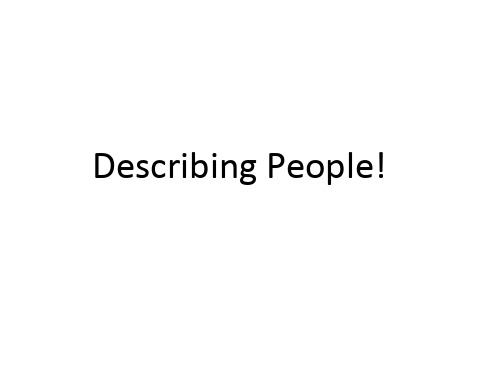
• •
Describing appearance: Height: Tall / Short
Build • Thin, Skinny, Slender / Fat, Chubby / Average / Athletic, Bulky Hair • Long, Short / Straight, wavy, Curly / (Color) / Bald • Ponytail / pigtails / bun / bangs / braid / buzzed Skin color • Light, Dark, Tan, White, Black, Brown, Red Face • Shape: Round, Thin, Long • Eyes: Round, Big, Small, Thin, Close • Eyebrows: thin, thick • Nose: Big, Small, Wide, Button, Hooked, Thin, Long, Round • Mouth: Thin lips, Full lips, Wide, Masculine / Feminine
Words that refer to bad social behavior:
• Aggressive: verbally or physically threatening • Bossy: always telling people what to do • Inconsiderate: not caring about others or their feelings • Irritating: bothering people • Moody: being unpredictable; changing moods often • Rude: treating people badly; breaking social rules • Thoughtless: not thinking about the effects of your actions or words
describing people
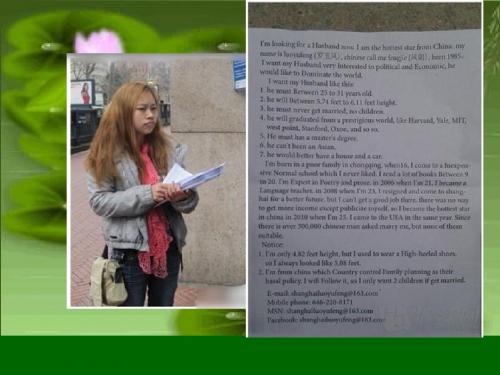
Tip 3: 用非谓语动词作状语
14岁时,对音乐表现出浓厚兴趣,她开始创作歌曲。 She showed great interest in music atbegan the to Showing great interest in music, she age of 14. her Sheown began to compose her compose music at the age ofown 14. music. 2)获得中山大学硕士学位之后,他 出国深造。 Having received a master’s degree ________________________________ from Zhongshan University, he went abroad to further his study.
珠海市实验中学高三英语组欢迎您的指导
Learning Goals
1. To brush up the words and expressions related to people; 2. Try to use the vocabulary to describe people in the form of a marriage personal.
age
young/ old/ middle-aged at the age of / by the age of
in one’s 20s
at an early age
born on…(过去分词作状语)
figure
tall/ short/ middle height 1.76 meters tall/ in height thin/ slim/ fat/ overweight well-built/ stocky(矮壮的)/ medium-sized(中等的)
小学高年级英语阅读课describing people
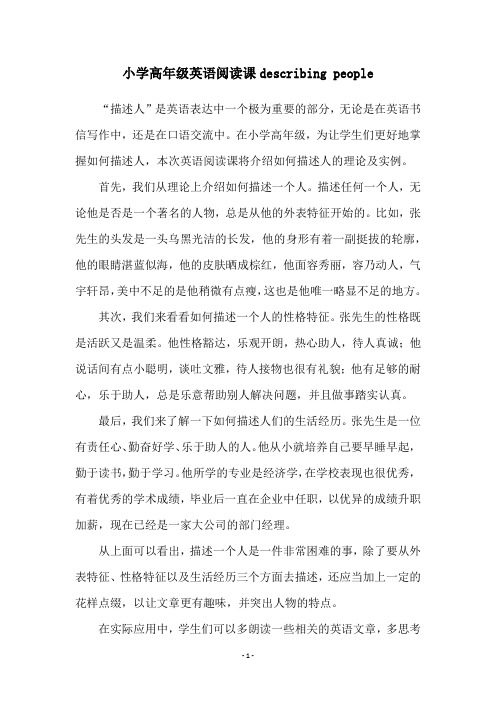
小学高年级英语阅读课describing people “描述人”是英语表达中一个极为重要的部分,无论是在英语书信写作中,还是在口语交流中。
在小学高年级,为让学生们更好地掌握如何描述人,本次英语阅读课将介绍如何描述人的理论及实例。
首先,我们从理论上介绍如何描述一个人。
描述任何一个人,无论他是否是一个著名的人物,总是从他的外表特征开始的。
比如,张先生的头发是一头乌黑光洁的长发,他的身形有着一副挺拔的轮廓,他的眼睛湛蓝似海,他的皮肤晒成棕红,他面容秀丽,容乃动人,气宇轩昂,美中不足的是他稍微有点瘦,这也是他唯一略显不足的地方。
其次,我们来看看如何描述一个人的性格特征。
张先生的性格既是活跃又是温柔。
他性格豁达,乐观开朗,热心助人,待人真诚;他说话间有点小聪明,谈吐文雅,待人接物也很有礼貌;他有足够的耐心,乐于助人,总是乐意帮助别人解决问题,并且做事踏实认真。
最后,我们来了解一下如何描述人们的生活经历。
张先生是一位有责任心、勤奋好学、乐于助人的人。
他从小就培养自己要早睡早起,勤于读书,勤于学习。
他所学的专业是经济学,在学校表现也很优秀,有着优秀的学术成绩,毕业后一直在企业中任职,以优异的成绩升职加薪,现在已经是一家大公司的部门经理。
从上面可以看出,描述一个人是一件非常困难的事,除了要从外表特征、性格特征以及生活经历三个方面去描述,还应当加上一定的花样点缀,以让文章更有趣味,并突出人物的特点。
在实际应用中,学生们可以多朗读一些相关的英语文章,多思考英语论文写作中常用的描述文字,以及如何描述自己的外表特征、性格特征和生活经历,然后结合练习,在此基础上再运用所学知识编写描述人的文章。
总之,描述人是一门值得学生们深入研究和努力掌握的课程,这也是小学高年级英语阅读课中的重要部分,可以帮助学生更好地描述一个人,增强英语表达能力。
高教版基础英语第二册教案——Unit 2 Describing People
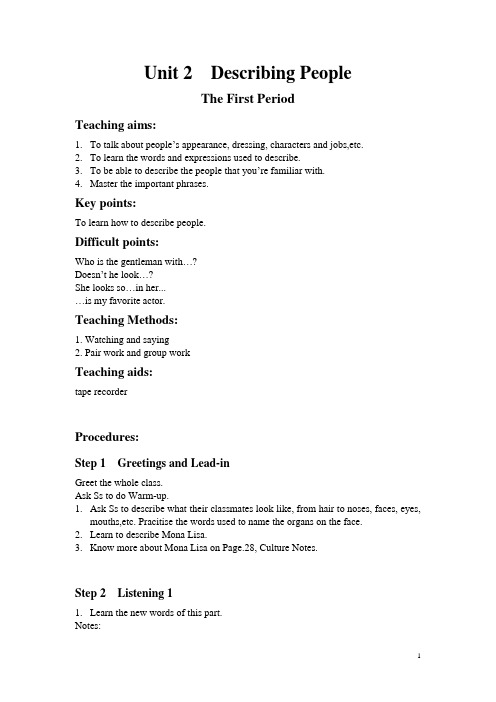
Unit 2 Describing PeopleThe First PeriodTeaching aims:1.To talk about people’s appearance, dressing, characters and jobs,etc.2.To learn the words and expressions used to describe.3.To be able to describe the people that you’re familiar with.4.Master the important phrases.Key points:To learn how to describe people.Difficult points:Who is the gentleman with…?Doesn’t he look…?She looks so…in her...…is my favorite actor.Teaching Methods:1. Watching and saying2. Pair work and group workTeaching aids:tape recorderProcedures:Step 1 Greetings and Lead-inGreet the whole class.Ask Ss to do Warm-up.1.Ask Ss to describe what their classmates look like, from hair to noses, faces, eyes,mouths,etc. Pracitise the words used to name the organs on the face.2.Learn to describe Mona Lisa.3.Know more about Mona Lisa on Page.28, Culture Notes.Step 2 Listening 11.Learn the new words of this part.Notes:oval adj.椭圆的blonde adj. 金发白肤的n. 金发女郎curly adj. 卷曲的;卷发的brown adj. 褐色的;棕色的n. 褐色lawyer / n. 律师two-piece adj. & n. 由两件组成一套的(衣服)yellow n.& adj.黄色(的)suit n.套装grandpa n.爷爷2. Ask Ss to look at the pictures, and then prepare doing listening.3. Play the tape. Ask Ss to do the match.4.Play the tape again, and then check the answers with the whole class.Script of listening:1. Richard Clayderman has got light brown hair.2. Celine Dion has got dark brown hair.3. Liu Huan has got straight black hair.4. Madonna has got curly blond hair.Step 3 Dialogue 11.Explain some important words and useful sentences. Encourage Ss to make somesentences.2.Explain the important phrases and divide the students into 3 groups to discuss andcomplete the dialogue with the words given below.3.Play the tape and ask Ss to read after it, and then ask Ss to play the dialogue.4.Let Ss to guess where the dialogue takes place and the relation between them.Ask Ss to talk about the words about clothing, like coat, suit, dress, jacket, tie, shirt, trousers, jeans, skirt, etc.5.Remember the following important phrases:Who is the gentleman with…?Doesn’t he look…?She looks so…in her...…is my favorite actor.Step 4 Role Play 11.Practise the important phrases and words.2.Ask Ss to practise the dialogue as Dialogue 1. Ask some Ss to play the dialogue infront of the class.3.Ask Ss to practise more about this pattern.Step 5 Homework1.Make a dialogue in pairs with the knowledge learnt today.2.Copy the new words three times.3.Recite the dialogue 1 on page19.The Second Period Teaching aims:1.To learn how to describe the people Ss are familiar with.2.To complete the dialogue with the words given in the box.3.To master some words and phrases.Key points:How to talk about people’s appearance, weight, height, etc. Difficult points:You know…,don’t you?He’s the first Chinese man in…He’s in his early 40s.He’s of medium height.I wish I could…Teaching Methods:1. Watching and saying2. Pair work and group workTeaching aids:tape recorderProcedures:Step 1 Greetings and Lead-inGreet the whole class.Review the important phrases learned last period.Step 2 Listening 21.Learn the new words of this part.Notes:glasses n.眼镜height n.高度astronaut n.宇航员;太空人someday adv.(将来)有一天middle-aged adj.中年的medium-sized adj.中型的,中号的2.Ask Ss to look at the pictures, and ask them to say who they are in English.3.Play the tape, and ask Ss to do the match.4.Play the tape again, and then check the answers with the whole class.Script of listening:1. Jack Welch became the CEO of GE very early.2. Charles Wang founded CA.3. Donald Trump became interested in real estate very early.4. Joyce Hall founded the Hallmark Cards Company.Step 3 Dialogue 21.Explain some important words and useful sentences. Encourage Ss to make somesentences.2.Practise how to fill the blanks correctly, introduce more words about Yang Liwei,like astronaut, pilot, airplane,etc.3.Play the tape and Ss read after it. Then ask some Ss to play the dialogue.4.Remember the following important phrases:You know…,don’t you?He’s the first Chinese man in…He’s in his early 40s.He’s of medium height.I wish I could…Step 4 Role Play 21.Practise the important phrases and words.2.Ask Ss to practise the dialogue as Dialogue 2.3.Master how to talk about people’s appearance, weight, height, etc.Step 5 Homework1.Make a dialogue in pairs with the knowledge learnt today.2.Copy the new words three times.3.Recite the dialogue on page 21.The Third PeriodTeaching aims:1.To learn how to talk about the characters of the teachers and relatives2.To do some listening and learn the words about occupatations.3.To master some words and phrases.Key points:Talk about the teachers’ features.Difficult points:What do you think of…?How about…?What makes her such a nice teacher?She’s very…You won’t be sorry.Teaching Methods:1. Watching and saying2. Pair work and group workTeaching aids:tape recorderProcedures:Step 1 Greetings and Lead-inGreet the whole class.Review the important phrases learned last period.Step 2 Listening 31.Learn the new words of this part.Notes:estate n.不动产;财产developer n.开发者;启发者founder n.创办人boring adj. 令人厌烦的,单调沉闷的asleep adj.睡着的hardworking adj.苦干的,不辞辛劳的real estate 房地产;不动产fall asleep 入睡;长眠get into 参加;加入2.Ask Ss to look at the words, and ask them to guess what they are going to listen.3.Play the tape, and ask Ss to match the answers.4.Play the tape again, and then check the answers with the whole class.Script of Listening 31. Jack Welch became the CEO of GE very early.2. Charles Wang founded CA.3. Donald Trump became interested in real estate very early.4. Joyce Hall founded the Hallmark Cards Company.Step 3 Dialogue 31.Explain some important words and useful sentences. Encourage Ss to make somesentences.2.Have the students work in groups and fill in the blanks with the words given.3.Play the tape and Ss read after it. Then ask some Ss to play the dialogue.4.Let Ss to guess where the dialogue takes place and what relation between them.5.Remember the following important phrases:What do you think of…?How about…?What makes her such a nice teacher?She’s very…You won’t be sorry.Step 4 Role Play 31.Explain the important words and phrases, and then practise them.2.Ask Ss to practise the dialogue as Dialogue3.3.Ask Ss to make a dialogue to talk about what their teachers look like.Step 5 Homework1.Make a dialogue in pairs with the knowledge learnt today.2.Copy the new words three times.3.Recite the dialogue on page 22.The Fourth PeriodTeaching aims:1.To talk about their favorite musicians.2.To talk about what’s needed to be a qualified musician.3.To master some words and phrases.Key points:Talk something about the muisiciansDifficult points:At the age ofBe attended toTake part inTeaching Methods:1. Watching and saying2. Pair work and group workTeaching aids:tape recorderProcedures:Step 1 Greetings and Lead-inGreet the whole class.Review the dialogue 3 learned last period.Step 2 Pre-reading Activities1.Learn the new words of this part.Notes:academy n. (高等)专科院校,研究院prize n. 奖赏;奖金;奖品medal n. 奖章,勋章;纪念章reporter n. 记者at the age of 在…岁时be attached to 附属于…take part in 参与,参加2.Ask Ss to talk about their favorite musicians with their partners, prepare someuseful words like classical music, light music, pop music, rock music, etc.3.Introduce some famous pianists, like Beethoven, Bach, Tchaikovsky, RichardClayderman.Step 3 Text1.Explain some important words and useful sentences. Encourage Ss to make somesentences.2.Play the tape and Ss read after it. Then ask some Ss to read the text.3.Ask Ss to finish the comprehension exercises, then check answers with the wholeclass, and ask Ss to correct the sentences.4.Grammar: This apart is about Attributive Clause. Ask Ss to find the relatedsentences from the text.5.Culture Notes◊Mona Lisa文艺复兴时期的艺术巨匠达•芬奇的名画《蒙娜丽莎》◊Modonna 美国当代著名歌星麦当娜◊Celine Dion 加拿大著名歌星席琳•迪翁◊Richard Clayderman 当代法国著名钢琴家理查德•克莱德曼◊Michael Jordan 美国著名篮球巨星迈克尔•乔丹,素有“空中飞人”之称。
Describing_People_(写作讲解)
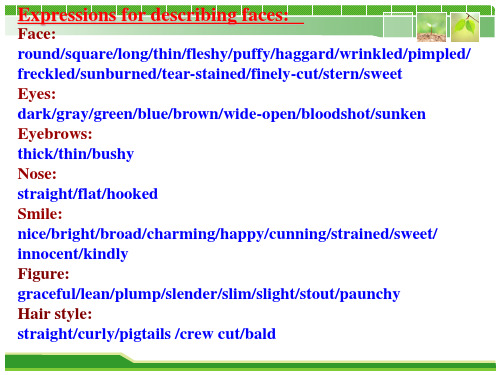
Face: round/square/long/thin/fleshy/puffy/haggard/wrinkled/pimpled/ freckled/sunburned/tear-stained/finely-cut/stern/sweet Eyes: dark/gray/green/blue/brown/wide-open/bloodshot/sunken Eyebrows: thick/thin/bushy Nose: straight/flat/hooked Smile: nice/bright/broad/charming/happy/cunning/strained/sweet/ innocent/kindly Figure: graceful/lean/plump/slender/slim/slight/stout/paunchy Hair style: straight/curly/pigtails /crew cut/bald
bad-tempered narrow-minded bossy pessimistic selfish childish timid greedy mean moody ignorant
Expressions for describing personalities:
amiable dedicated disciplined efficient energetic faithful generous impartial industrious ambitious hospitable initiative loyal obedient painstaking punctual stubborn thoughtful
Describing people 描述他人

Describing PeopleSentences:Personality and AppearanceDescription Well, he's very friendly, smart and funny.1.Tell me about your father. What kind of person is he? 2. What does he look like? 3. What does your mother look like? 4. How about your little sister?He's young, short and handsome. He has straight black hair and green eyes. She's tall, thin and beautiful. She has blonde hair and wears glasses. She has curly red hair and a cute smile. Everybody likes her.Clothing 1. What is your brother wearing? 2. What kind of shoes does he have (on)? 3. Is Susan wearing a dress? 4. Anything else? Description He's wearing light brown pants and an orange t-shirt. Sneakers, and he's wearing white socks. No. She's wearing a blue skirt and a yellow blouse. Yes. She's wearing boots and carrying a purse.Practice: 1. Think about some questions by the students themselves. 2. Ask some questions; see if the students can answer them right. 3. Let the students ask questions, see if they can understand what the teacher answered.Words to know:Friendly Smart Funny Old Young Tall Short Straight Curly Handsome Thin Cute Black White Green Blue Glasses Beautiful Hair Eye Smile Wear Shoes T-shirt Sneakers Socks Skirt Blouse Boots Purse Carry Dress Tie Coat Sweater Jeans Pants Shorts Belt HandbagHomework:Write down three pairs of sentences, Q&A, about your mother, father and one of your classmates. In the following pattern: ---- What does … look like? ---- He/she is/has … Read them after writing them down.。
describing a person

Describe a person1. AppearanceAge: young; middle aged; oldHeight: short; pretty short; medium height; p retty tall; tallBuild/ figure: thin; slim; slender; medium build; fat; lean, strong, masculine Hair: long; short; blonde; black grey; brown; straight; curlyLooks: a man of striking appearance handsome; good looking; beautiful;pretty; lovely; hot, sexy, gorgeous, charming, elegantOther features: freckles, mole, pimples, dimples, a pointed chin,double chin; beard;moustache; scars; glasses; spectaclesPersonality他多才多艺He's versatile.她是个很能干的人 She's a real go-getter. / she is competent她口才很好She's eloquent/ talkative他善于交际He is sociable/ unsociable他很开明He is open-minded/ broad-minded他很坦率He is frank他很热情He is enthusiastic.他容易相处He is easy to get along with ; he is easy going他助人为乐/ 很热心He is always ready to help others/ warm-hearted他很有事业心She is enterprising他富于创新精神He is creative他富有想象力He is imaginative他很自信He is self-confident他很明智He is sensible他很敏感He is sensitive他是个有责任心的人He is a responsible man他值得信赖He is trust worthy他很诚实He is honest他很幽默He is humorous他很慷慨He is generous他很有风度He is gentle他很和蔼He is amicable他很内向/外向He is very reserved./ He is introverted/extroverted她很细心体贴She is thoughtful/ caring/ considerate/kind他很有耐心He is patient他很有主见He knows his own mind他优柔寡断He is indecisive她很喜欢出风头She likes to show off她是个马屁精She is a bootlicker她很挑剔She is picky他经常说别人坏话 He often speaks ill of others他爱吹牛He likes to brag她净说好话She is a smooth talker你有胆量You have a lot of guts她是个长舌妇She is a gossip他是个败家子He is a black sheep他是个老顽固He is a stubborn / he keeps ideas to himself他骄傲自大He is stuck-up他很狡诈He is as sly as a fox他头脑简单He is simple-minded他爱摆架子He is acting big他非常冷静He is as cool as cucumberDescribing a person at work (working attitude)Mature,dynamic and honest.思想成熟、精明能干、为人诚实。
描写人物的英语作文Describing People_英语作文
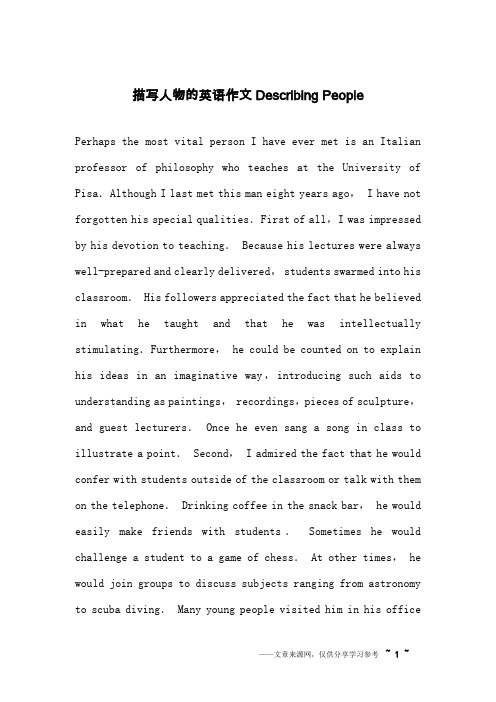
描写人物的英语作文Describing PeoplePerhaps the most vital person I have ever met is an Italian professor of philosophy who teaches at the University of Pisa.Although I last met this man eight years ago, I have not forgotten his special qualities.First of all,I was impressed by his devotion to teaching. Because his lectures were always well-prepared and clearly delivered, students swarmed into his classroom. His followers appreciated the fact that he believed in what he taught and that he was intellectually stimulating.Furthermore, he could be counted on to explain his ideas in an imaginative way,introducing such aids to understanding as paintings, recordings,pieces of sculpture,and guest lecturers. Once he even sang a song in class to illustrate a point. Second, I admired the fact that he would confer with students outside of the classroom or talk with them on the telephone. Drinking coffee in the snack bar, he would easily make friends with students.Sometimes he would challenge a student to a game of chess. At other times, he would join groups to discuss subjects ranging from astronomy to scuba diving. Many young people visited him in his officefor academic advice;others came to his home for social evenings. Finally,I was attracted by his lively wit. He believed that no class hour is a success unless the students and the professor share several chuckles and at least one loud laugh.Through his sense of humor, he made learning more enjoyable and more lasting.If it is true that life makes a wise man smile and a foolish man cry,then my friend is truly a wise man. Probably the best example of his wit is this bit of wisdom with which he once ended a lecture:“It is as dangerous for man to model himself upon his invention, the machine,as it would be for God to model Himself upon His invention.”也许,我所遇见的最有活力的人要算一位在比萨大学教书的意大利哲学教授。
六年级英语作文第二单元
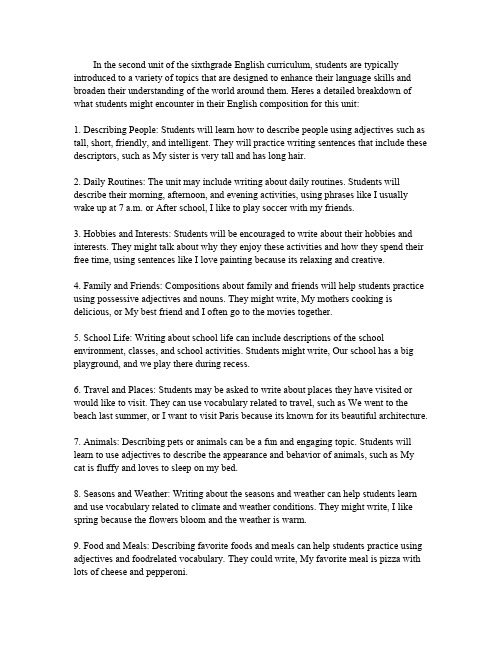
In the second unit of the sixthgrade English curriculum,students are typically introduced to a variety of topics that are designed to enhance their language skills and broaden their understanding of the world around them.Heres a detailed breakdown of what students might encounter in their English composition for this unit:1.Describing People:Students will learn how to describe people using adjectives such as tall,short,friendly,and intelligent.They will practice writing sentences that include these descriptors,such as My sister is very tall and has long hair.2.Daily Routines:The unit may include writing about daily routines.Students will describe their morning,afternoon,and evening activities,using phrases like I usually wake up at7a.m.or After school,I like to play soccer with my friends.3.Hobbies and Interests:Students will be encouraged to write about their hobbies and interests.They might talk about why they enjoy these activities and how they spend their free time,using sentences like I love painting because its relaxing and creative.4.Family and Friends:Compositions about family and friends will help students practice using possessive adjectives and nouns.They might write,My mothers cooking is delicious,or My best friend and I often go to the movies together.5.School Life:Writing about school life can include descriptions of the school environment,classes,and school activities.Students might write,Our school has a big playground,and we play there during recess.6.Travel and Places:Students may be asked to write about places they have visited or would like to visit.They can use vocabulary related to travel,such as We went to the beach last summer,or I want to visit Paris because its known for its beautiful architecture.7.Animals:Describing pets or animals can be a fun and engaging topic.Students will learn to use adjectives to describe the appearance and behavior of animals,such as My cat is fluffy and loves to sleep on my bed.8.Seasons and Weather:Writing about the seasons and weather can help students learn and use vocabulary related to climate and weather conditions.They might write,I like spring because the flowers bloom and the weather is warm.9.Food and Meals:Describing favorite foods and meals can help students practice using adjectives and foodrelated vocabulary.They could write,My favorite meal is pizza with lots of cheese and pepperoni.10.Stories and Narratives:The unit may include writing short stories or narratives. Students will learn to use past tense verbs and sequence words like then,after,and finally to tell a story,such as One day,I went to the park and played with my friends.Each of these topics will be accompanied by vocabulary lists,grammar points,and writing exercises to help students improve their English composition skills.Teachers may also provide model compositions and peerediting sessions to further enhance the learning experience.。
英语作文中描写人的外貌
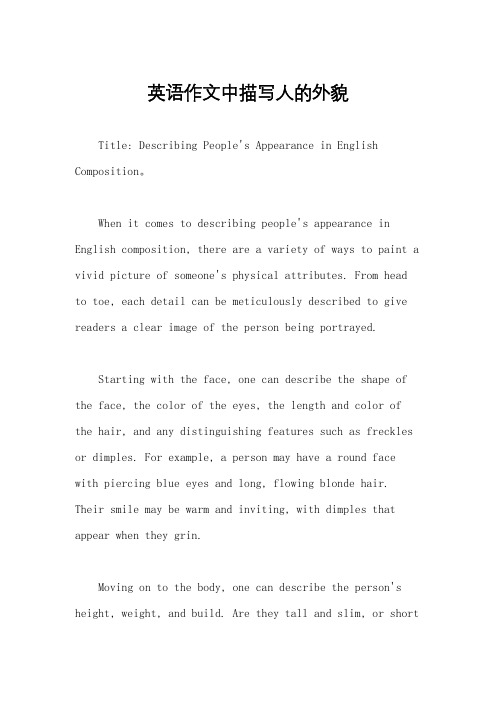
英语作文中描写人的外貌Title: Describing People's Appearance in English Composition。
When it comes to describing people's appearance in English composition, there are a variety of ways to paint a vivid picture of someone's physical attributes. From head to toe, each detail can be meticulously described to give readers a clear image of the person being portrayed.Starting with the face, one can describe the shape of the face, the color of the eyes, the length and color of the hair, and any distinguishing features such as freckles or dimples. For example, a person may have a round face with piercing blue eyes and long, flowing blonde hair. Their smile may be warm and inviting, with dimples that appear when they grin.Moving on to the body, one can describe the person's height, weight, and build. Are they tall and slim, or shortand stocky? Do they have broad shoulders or a narrow waist? These physical attributes can help to create a moredetailed and realistic image of the person in the reader's mind.Clothing and accessories can also play a role in describing someone's appearance. Are they dressed casually in jeans and a t-shirt, or are they wearing a formal suit and tie? Do they have any accessories, such as glasses or jewelry, that add to their overall look?Overall, describing people's appearance in English composition requires attention to detail and the ability to paint a vivid picture with words. By focusing on the face, body, and clothing of the person being described, writers can create a clear and detailed image that brings their characters to life on the page.。
- 1、下载文档前请自行甄别文档内容的完整性,平台不提供额外的编辑、内容补充、找答案等附加服务。
- 2、"仅部分预览"的文档,不可在线预览部分如存在完整性等问题,可反馈申请退款(可完整预览的文档不适用该条件!)。
- 3、如文档侵犯您的权益,请联系客服反馈,我们会尽快为您处理(人工客服工作时间:9:00-18:30)。
20. Describing People
The adjectives below could be used in the following sentence: "She's very _________. " Or, "She's a very _______ person." Or, "She's a very _______ type of person."
Of course, instead of, 'very' you can also use other words such as: 'quite', 'rather', '
somewhat', 'really' and, 'extremely'.
∙friendly
∙easy-going
∙laid-back (= habitually very
relaxed; not easily excited or
angered)
∙relaxed
∙mellow
∙open
∙natural
∙warm-hearted
∙hospitable (= a very welcoming host towards guests)
∙generous
∙helpful
∙co-operative
∙humorous
∙funny
∙interesting
∙unique
∙special
∙impressive
∙kind
∙empathetic
∙sympathetic
∙nice
∙good
∙honest (= does not lie, cheat,
steal etc.)
∙considerate
∙thoughtful (= considerate =
thinks about the feelings and
welfare of other people)
∙caring
∙selfless (the opposite is, 'selfish') ∙down-to-earth
∙idealistic ∙extroverted (the opposite is, 'introverted')
∙outgoing
∙gregarious
∙sociable
∙spontaneous
∙Introverted (This means, 'usually focused on one's own thoughts',
such as a research scientist, an
author or anyone who is
habitually a deep thinker.)
∙shy (This means, 'a little fearful' of other people)
∙sensitive
∙private
∙quiet
∙studious
∙traditional
∙conservative
∙old-fashioned
∙fashionable
∙'cool'
∙'hip'
∙modern
∙fashion-conscious
∙stylish
∙well-groomed
∙well-dressed
∙attractive
∙good-looking
∙handsome
∙beautiful
∙pretty
∙elegant
∙graceful
∙gentle
∙statuesque (usually for tall
women)
∙well-mannered
∙cultured
∙sophisticated
∙open-minded
∙confident
∙competitive
∙fearless
∙independent
∙individualistic
∙adventurous
∙rebellious
∙persistent
∙industrious = hard-working
∙motivated
∙single-minded
∙goal-oriented
∙determined
∙ambitious
∙strong-willed
∙passionate
∙enthusiastic
∙well-balanced
∙positive
∙healthy
∙fit (= healthy, especially with strong muscles, a healthy heart
and healthy lungs - Someone
who can walk up a high
mountain without resting is "very fit".)
∙health-conscious
∙athletic
∙physical
∙artistic
∙talented
∙capable
∙musical
∙theatrical
∙dramatic
∙expressive
∙intelligent
∙smart (U.S. (informal) =
intelligent; Br. = well-dressed) ∙bright
∙analytical
∙erudite = well-read (usually for older people)
∙well-educated
∙well-informed
∙knowledgeable
∙skilled, skillful
∙professional
∙thorough
∙careful
∙neat
∙precise
∙meticulous
∙reliable
∙punctual
∙curious
∙far-sighted
∙insightful
∙intuitive
∙wise
∙mature
∙responsible
∙sensible
∙imaginative
∙creative
∙playful (usually children)
∙rambunctious (e.g., a 2-yr-old child)
∙energetic
∙adorable (Don't say "very
adorable". But "really adorable"
is ok.)
∙cute
∙loveable
∙lovely
∙loving
Some nouns
∙ a joy (e.g., 'a joy to be around')
∙an inspiration
∙an example
∙ a model student
∙ a model son
∙ a devoted mother, a devoted teacher, a devoted doctor
∙ a genius
∙ a leader
∙ a non-conformist
∙ a rebel
∙an idealist。
